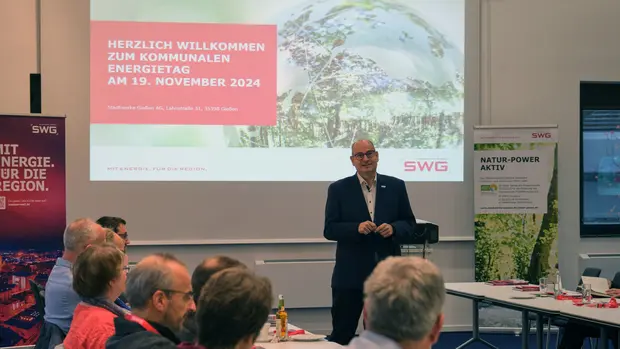
Stadtwerke Gießen provides information on current energy issues to local authority managers in the district.
Municipal heat planning, coherent energy management for their own properties, efficient street lighting - the topic of energy is increasingly posing challenges for towns and municipalities. In view of the numerous tasks that those responsible in the town halls have to deal with, it is hardly surprising that 35 representatives from 17 municipal administrations and the district once again took the opportunity to find out about current developments at Stadtwerke Gießen (SWG). "With the Municipal Energy Days, we want to show those responsible in the town halls what measures municipalities can use to drive the energy transition forward locally and save money in the medium term," says Andreas Fuchs, Head of Sales at SWG, explaining the idea behind the regular information event.
Great interest, relevant topics
The format is clearly hitting the mark. Now in its third edition, the Municipal Energy Days once again met with great interest. "We were able to welcome many familiar faces," says Andreas Fuchs, a sure sign that the selected topics are relevant to the target group. In fact, the participants were mainly municipal employees from the areas of climate protection management, building and maintenance depots, building administration and water and wastewater management. "To ensure that as many people as possible can make the half-day business trip to SWG, we are offering two events with the same content on two different days of the week," adds Andreas Fuchs.
Probably the most urgent energy topic for cities and municipalities was at number one on the agenda: "Municipal heat planning is still a source of concern for many," says Andreas Fuchs. The visitors therefore listened attentively to the presentation, which dealt with successful practical examples, deadlines to be met and subsidies from the state treasury, among other things. The second presentation focussed on the opportunities opened up by municipal energy management. "There is great potential here, and the effort involved is manageable," said Andreas Fuchs, citing the main arguments in favour of its introduction. Under the title "Intelligent energy solutions for local authorities", an SWG expert described well thought-out heat contracting and how such projects can be designed from the outset as a nucleus for a later local or district heating supply.
Another presentation dealt with the electricity balancing circuit model and thus the option of providing complete proof of how much green electricity is already being generated in the municipality and documenting progress in the energy transition. A presentation on LED street lighting, which covered all the important aspects of this modern technology, rounded off the information event. "We also briefly presented our PowerLahn lighthouse project and described the opportunities that the use of modern LoRaWAN technology opens up for local authorities," summarised Andreas Fuchs.
Of course, the organisation team had planned enough time to ask questions and exchange ideas. "The various presentations serve as an impetus for subsequent dialogue and discussion," says Andreas Fuchs, explaining the concept. Planning is already underway for the Municipal Energy Days in spring 2025.

